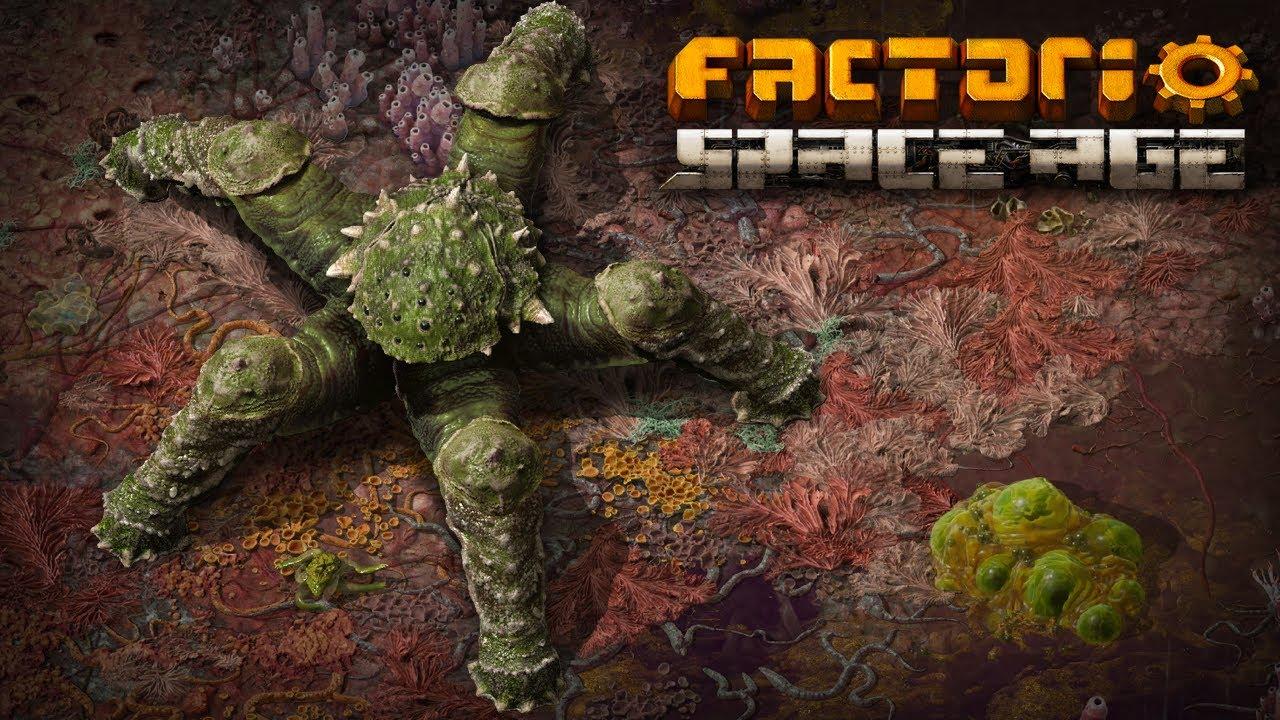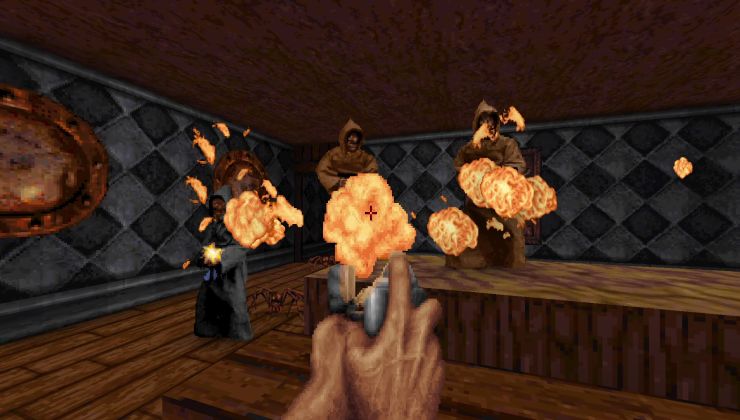Factorio is a game about building and automating, but it's also all about defending from vicious aliens and the new lot coming in Factorio: Space Age look like the stuff of nightmares.
The developers have been showing off some of the new planets coming with the expansion that's due in October, and one planet they've been highlighting recently is Gleba. Originally known internally as the "biological planet", it looks a whole lot more alive than other planets. In fact, it looks really gross and vibrant and I can't wait to explore and cover it with belts.
In the latest developer diary, the team showed off some of the horrors that will await you on planet Gleba. And uh, you're going to need some firepower to deal with them. Based on "distant relatives of starfish or seastars", you'll be facing off against small and rather large 5-legged Pentapods.
Since Factorio will have multiple planets in the expansion, the developers are doing some interesting balancing work on the enemies here. As you might face them late in the game when you're fully equipped, or you might go in a bit under-prepared depending on where you expand. Thankfully, these new beasties won't seek you out right away to devour you, instead mainly focusing on protecting their nests or nearby allies. As the developer said they are "fairly passive" but "If you do fight them and win then they will evolve".
Have a look at them below:

Direct Link
Factorio has Native Linux support and is Steam Deck Verified.
Factorio is available to buy on:
Factorio is available to buy on:Missing one. Directly from devs.
GOG
Humble Store
Steam
I no longer remember what I did to get where I am, but it all seems to
work, so I won't argue.
Quoting: TcheyI almost want this game, without the Factory elements, just exploration, some simple base building maybe, and RPG-action stuffYeah like a mix Dwarf Fortress exploration mode or something.
Quoting: TheRiddickChill my dudes, I just want to convert your planet into a CAPITALISM!It's centraly planed (by you) without free market. so i don't think capitalism is right word to describe it.
I don't think we can use words as capitalism or socialism where there is just one person. With multiplayer it's more like socialism with sharing all resources between all players…
Quoting: ArtenIt's centraly planed (by you) without free market.I meant more in terms of converting planet into profit.
Quoting: TheRiddickSo when you are in woods collect mushrooms for your consumption or cooking in your kitchen, you do it for profit? Yes in large definition you do it for profit, but if you call it capitalism, then everithink is capitalism and word capitalism lost meaning.Quoting: ArtenIt's centraly planed (by you) without free market.I meant more in terms of converting planet into profit.
You transform planet in any system. Just look what comunists did in ussr or czechoslovakia…
Last edited by Arten on 19 Aug 2024 at 8:32 am UTC
Quoting: ArtenSo when you are in woods collect mushrooms for your consumptionIn the game you literally are converting the entire biome of the planet to a giant factory for production. Since when does profit exclusively mean currency?
Quoting: TheRiddickBut converting biome into giant factory is not exclusive for capitalism (just look what communists did). And also, there are capitalistic incentives not converting everything.Quoting: ArtenSo when you are in woods collect mushrooms for your consumptionIn the game you literally are converting the entire biome of the planet to a giant factory for production. Since when does profit exclusively mean currency?
Converting biome of planet into factory is what humanity do. Regardles of system.
Quoting: ArtenThat last is not strictly true. If you look at the history of humanity, we've been doing that for under 300 years, out of at least tens of thousands.Quoting: TheRiddickBut converting biome into giant factory is not exclusive for capitalism (just look what communists did). And also, there are capitalistic incentives not converting everything.Quoting: ArtenSo when you are in woods collect mushrooms for your consumptionIn the game you literally are converting the entire biome of the planet to a giant factory for production. Since when does profit exclusively mean currency?
Converting biome of planet into factory is what humanity do. Regardles of system.
Quoting: Purple Library GuyThat is just because we did not have technology which enables real factories. But if you look what humanity did before that, you see lot of farming which replaced original nature, with food "factory" known as fields... Changing world for producing goods is what humanity do. Now, we have more coplex stuff we want to make, so we make real factories. But change is proportional to population and technology level.Quoting: ArtenThat last is not strictly true. If you look at the history of humanity, we've been doing that for under 300 years, out of at least tens of thousands.Quoting: TheRiddickBut converting biome into giant factory is not exclusive for capitalism (just look what communists did). And also, there are capitalistic incentives not converting everything.Quoting: ArtenSo when you are in woods collect mushrooms for your consumptionIn the game you literally are converting the entire biome of the planet to a giant factory for production. Since when does profit exclusively mean currency?
Converting biome of planet into factory is what humanity do. Regardles of system.
Quoting: ArtenNo. This is an oversimplification so vast as to do major violence to the truth. There are differences between different ways of organizing society; they create different motivations and incentives. Consider that through all of prehistory and recorded history, the world population grew very, very slowly, almost flat. We always had the potential to explode in population (well, briefly, until the crash), but never did.Quoting: Purple Library GuyThat is just because we did not have technology which enables real factories. But if you look what humanity did before that, you see lot of farming which replaced original nature, with food "factory" known as fields... Changing world for producing goods is what humanity do. Now, we have more coplex stuff we want to make, so we make real factories. But change is proportional to population and technology level.Quoting: ArtenThat last is not strictly true. If you look at the history of humanity, we've been doing that for under 300 years, out of at least tens of thousands.Quoting: TheRiddickBut converting biome into giant factory is not exclusive for capitalism (just look what communists did). And also, there are capitalistic incentives not converting everything.Quoting: ArtenSo when you are in woods collect mushrooms for your consumptionIn the game you literally are converting the entire biome of the planet to a giant factory for production. Since when does profit exclusively mean currency?
Converting biome of planet into factory is what humanity do. Regardles of system.
The industrial revolution was not produced by technology, not really. There was a shift towards employment of people in "factories" in England before the steam engine; it was related to all the cheap raw materials they were getting from slave plantations in the New World. Adam Smith's famous example in Wealth of Nations about a pin factory involved no machinery, just division of labour. And it was only then, when you had (people in charge making profits) + (wage workers), that there was a reason to go looking for ways to pump up production. Before that, you had craft guilds, and they believed in keeping production relatively low and wages and craftsmanship standards high. Craft guilds would never have invented steam engines, and even if they did they wouldn't have used them to drive factories.
There have been a number of cases of independent invention of agriculture, and in some of them the hunter/gatherers involved abandoned the idea . . . probably because with agriculture, you have to bloody work for a living. Although at that, "gatherers" were never purely distinct from agriculture--they would plant useful things around the forest to make sure there were good things to grab later, but they left it at that, just tried for a mostly-natural environment that made things easier for people but didn't need upkeep. But the hunter/gatherer approach meant that if you screwed the place up, you'd be in trouble. There was no point in maximizing production, it would just mean you'd have to move somewhere else. Even most preindustrial agricultural societies tried to keep a balance; peasants still foraged, people needed firewood, pigs were often half-wild rooting in the woods.
The Soviet system is an odd sidebar--but the thing about it is it retained most of the basic characteristics of capitalism: You had employees working for a wage, someone else in charge, and an overarching goal of increasing production. That last bit was for somewhat different reasons, but it was the same goal, and not the only goal that human production has ever had.
Quoting: Purple Library GuyThat last is not strictly true. If you look at the history of humanity, we've been doing that for under 300 years, out of at least tens of thousands.PGL has a very valid point. It is not Capitalism or Communism that is the issue here. We are actually talking about Industrialism. In the West, Industrialism has been so closely tied with Capitalism that it's not surprising that someone might confuse the two. Industrialism has only been around for 300 years but it has transformed our society's way of thinking and viewing the world.
Quoting: Artenif you look what humanity did before that, you see lot of farming which replaced original nature, with food "factory" known as fields... Changing world for producing goods is what humanity do.The flaw here is that you are judging history from within the bias of the Industrial/Consumer society you live in. Certainly, now, the majority of farms are run like factories. That was not always the case. Farming was one of the last to be subjected to the specializations required for industrialization. Before that, farms were quite diversified. A single farmer kept a variety of livestock, grew a variety of crops -- doing this on a much smaller footprint than the modern industrial farm -- all of which made them more resilient to the vagaries of the market. Most farmers practised a subsistence lifestyle, which used to be considered quite respectable until the negative propaganda when the governments decided they wanted to industrialize farming. Subsistence living is not compatible with consumerism (which is necessary to industrialism's success).
Another example I can provide is the coppiced forests of pre-industrial Europe. Industrialism is all about the exploitation of resources. Prior to its advent, governments (and private interests, I imagine), used to maintain forests in a sustainable manner with long term goals of supplying timber and firewood without "strip-mining" or devastating the forests that supplied these products. Mankind worked with nature, nurturing rather than exploiting its resources.
There is a significant difference between the approaches and it is simplistic to conflate the two as if they were the same.
Quoting: Purple Library GuyThe Soviet system is an odd sidebarOf course, let us not confuse things here. Capitalism is an economic system whereas Communism is a political system. Communism is more realistically compared to Fascism, which is another political system. The primary difference is who owns the resources -- private interests (Fascism) or the State (Communism). Obviously, the goals of Capitalism are very compatible with those of Fascism.
Quoting: CaldathrasAll political systems are also in the end economic systems and vice versa. In some ways the defining characteristic of capitalism as opposed to other systems like say feudalism is not industrialism or even markets so much as the drive to separate power from responsibility (not that those other things aren't important, I'm just making an additional point). And that is a significant difference from Soviet Communism. That is, under capitalism, most power is exercised by "private" individuals, who have a great deal of control over the government but are not formally part of it and take no responsiblity for the results, and who directly control the lives of masses of people, but define their relationship with those people (employer/employee) as involving no responsiblities by the employer and no continuing ties with the employee. This avoidance of responsibility is rarely absolute, but you can see capitalists consistently trying to push it further--consider Uber.Quoting: Purple Library GuyThe Soviet system is an odd sidebarOf course, let us not confuse things here. Capitalism is an economic system whereas Communism is a political system. Communism is more realistically compared to Fascism, which is another political system. The primary difference is who owns the resources -- private interests (Fascism) or the State (Communism). Obviously, the goals of Capitalism are very compatible with those of Fascism.
By contrast, feudal relations between lords and people like men at arms or even peasants involved continuing ties and some responsibility--as a feudal lord those are your peasants, that is your land but it comes with those particular peasants and you have a duty to treat them in particular ways . . . often fairly crappy ways, and some lords broke the deal to greater or lesser extents, but still, fealty was a bi-directional relationship which gave the feudal lord responsibility along with their power. Employment does not, you pay them money and then they're supposed to piss off. And fascism, which is very explicitly connected with capitalism, definitely rocks the power without responsibility angle--note the way it tends to be explicitly opposed to responsibility-oriented restrictions like the rule of law. But the Soviet system was quite the opposite--the people in control took total responsibility, at least in theory. They had control and they were supposed to be turning the Soviet world into a paradise for the workers. That was the deal--they failed and to some extent reneged on the deal, but that was the job they claimed to be doing and they acknowledged, even embraced, the responsibility for doing it. And the people of the Soviet Union ultimately judged the Soviet bosses for their failure to live up to that responsibility . . . to this day, life in much of the post-Soviet Union involves a lot more poverty and precarity than it did under the Soviets, but nobody has much to say about it because those in charge take no responsibility for it.
Last edited by Purple Library Guy on 19 Aug 2024 at 6:26 pm UTC
Quoting: Purple Library GuyAll political systems are also in the end economic systems and vice versa.Maybe we'll have to agree to disagree. I do not believe that they are one and the same. Political systems are basically about governance and power. Certainly, most governments involve themselves with economics at some level (despite the delusions of Free Market pundits) but that does not make a political system an economic system. It certainly blurs the lines between the two, though.
Capitalism itself is not a political system. Instead, it's power-brokers mostly utilize a variant of democracy -- which is a political system -- to influence governance and power.
I would agree that an economic system can be a means to accruing wealth, which, in our society, tends to convey power. This is one place where things can overlap with a political system. Wealth and power seem to go hand-in-hand.
We live in a society that takes a very polarized view of things. It is not all black and white. There are many more economic systems than just Capitalism. Social Credit comes to mind as a recent example. What blurs the distinctions is that it often takes a political system to impose a new economic approach. Those who enjoy political and economic power in the existing system will generally oppose/resist any changes that might impact their influence and/or wealth.
I can only agree with your points about responsibility. I think you are spot on.











 How to setup OpenMW for modern Morrowind on Linux / SteamOS and Steam Deck
How to setup OpenMW for modern Morrowind on Linux / SteamOS and Steam Deck How to install Hollow Knight: Silksong mods on Linux, SteamOS and Steam Deck
How to install Hollow Knight: Silksong mods on Linux, SteamOS and Steam Deck